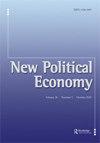太绿而不真实?在欧洲央行(ecb)达成气候共识
IF 3.8
2区 经济学
Q1 ECONOMICS
引用次数: 6
摘要
在2021年的战略评估中,欧洲央行管理委员会一致决定将气候变化作为未来几年的优先事项之一。在本文中,我们将尝试理解如何实现这一更改。为此,我们依靠混合方法,研究欧洲央行的政策、演讲、与欧洲议会的交流,以及进行半结构化采访。我们详细介绍了欧洲央行内部关于气候挑战的快速变化,并试图解开其可能性的条件。我们表明,气候一体化是内部动力和外部压力的结合和混合的结果。一方面,执行局的更新和组织动态的变化确保了越来越多的变革联盟。另一方面,来自政治家、非政府组织、学者和公民的压力推动该机构发展其专业知识,并为愿意的内部人士提供进一步的辩论资源,以推动他们的绿色议程。虽然这两种相互交织的动力使“绿鸽派”能够围绕气候行动计划达成共识,但管理委员会内部对未来绿化工作的范围和形式仍存在分歧。本文章由计算机程序翻译,如有差异,请以英文原文为准。
Too green to be true? Forging a climate consensus at the European Central Bank
ABSTRACT In its 2021 strategy review, the European Central Bank's Governing Council unanimously decided to make climate change one of its priorities for the coming years. In this article, we try to understand how this change was achieved. To do so, we rely on mixed methods, studying ECB policies, speeches, exchanges with the European Parliament, and conducting semi-structured interviews. We present a detailed account of the rapid changes within the ECB regarding the climate challenge, and attempt to unpack its conditions of possibility. We show that climate integration results from the combination and hybridisation of internal dynamics and external pressures. On the one hand, the renewal of the Executive Board and modifications in organisational dynamics secured a growing coalition for a change. On the other, pressures from politicians, NGOs, academics and citizens pushed the institution to develop its expertise and provided willing insiders with further argumentative resources to push their green agenda. While these two intertwined dynamics have allowed ‘green doves’ to forge a consensus around the climate action plan, disagreements remain within the Governing Council on the scope and shape of future greening efforts.
求助全文
通过发布文献求助,成功后即可免费获取论文全文。
去求助
来源期刊

New Political Economy
Multiple-
CiteScore
10.10
自引率
9.50%
发文量
41
期刊介绍:
New Political Economy aims to create a forum for work which combines the breadth of vision which characterised the classical political economy of the nineteenth century with the analytical advances of twentieth century social science. It seeks to represent the terrain of political economy scholarship across different disciplines, emphasising original and innovative work which explores new approaches and methodologies, and addresses core debates and issues of historical and contemporary relevance.
 求助内容:
求助内容: 应助结果提醒方式:
应助结果提醒方式:


